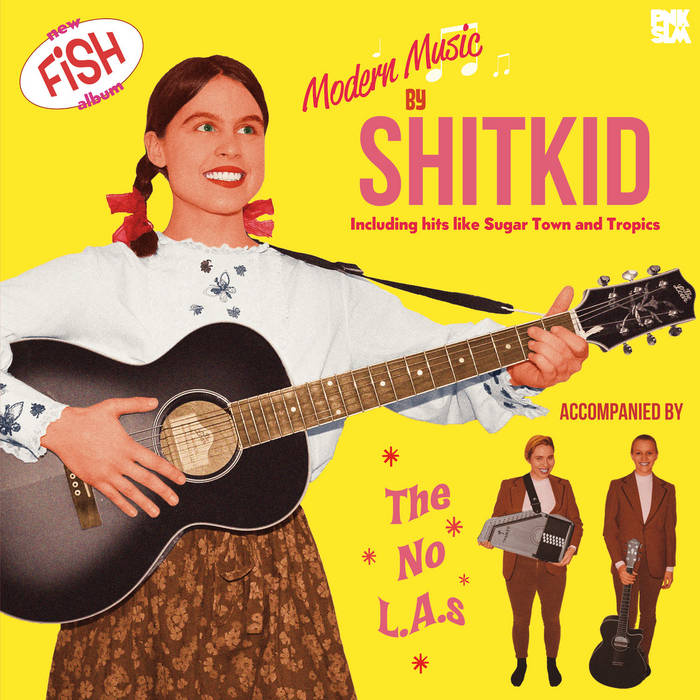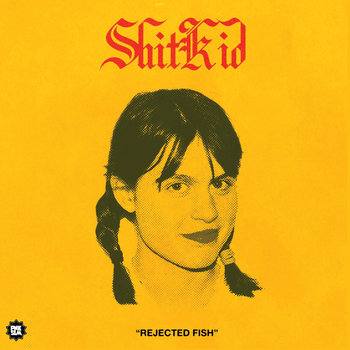Written by Candace Fernandez
I’ve never believed endings to be as finite as their temporal close. Rather, endings seem to work in emotional waves, where moments of memory and irrecollection evade our own realms of understanding and exist in a state of perpetual motion. For Åsa Söderqvist, the Swedish artist behind the musical project ShitKid, the unexpected repress of her 2017 album Fish merely illuminates the close of a chapter as unbounded by the numbers on a page. Under her former label PNKSLM where the majority of ShitKid’s discography can be found, the artist’s bio recounts how Söderqvist abandoned music in 2020, and isn’t looking back. That’s why the 2023 release of Rejected Fish is so significant, as it embodies a musical life that is thought to be forever gone.
Whether this musical resurgence was driven by Söderqvist or pushed by her former label is a question that remains unanswered. Yet, the varied sound between the 2017 release and the 2023 repress of the same tracks alludes to the purity of Söderqvist’s artistic intent. Prior to its 2017 release, Söderqvist abandoned the album’s studio recording one week before it was set to go public, rather opting to remain true to ShitKid’s origins as a solo project, for she made most of the new recording in her car and edited the album in garage band herself. The last-minute decision was driven by Söderqvist’s gut feeling that the studio version “sounded too good for ShitKid,” an interior sense that illuminates the radical authenticity of her creative perspective.
Söderqvist’s interior resistance towards the cleanliness of traditional recording is what makes her sound so alluring. The record maintains a foundation of musical skill while dually rejecting such expertise, an artistic choice that allows the listener to recognize a part of themself in each moment. By maintaining the grit of unrefined expression through refusals to restrict her sound to the conventions of studio production, Söderqvist utilizes Fish as an experimental road that allows her to explore the dimensionality of genre from garage-punk to alt-country in a way that mirrors the irreducible nature of human emotion itself.

Following the release of the self-recorded album, the non-conformist sentiments of Söderqvist’s sound was undeniably felt. It became PNKSLM’s best-selling record that year, and affirmed authenticity as eternally more compelling than the sonics of a recording studio could ever manipulate. ShitKid’s capacity for emotional reach through non-conformist musical production alludes to the power of imperfection, as it moved individuals on the basis of a melodic production we are all capable of, and have maybe even done ourselves. ShitKid’s Fish not only solidified the power of her own voice, but through its feminist undertones and refusal of mass tolerance, it returned self-sovereignty back to those who’d forgotten their autonomy was their own. By affirming one’s lovability as rooted not in self-dissolution, but in one’s radical commitment to remaining true to their interior life, ShitKid’s 2017 release became permanently fixed in the array of female rock’s assemblage.

That’s why I was skeptical of the 2023 release. Sporting a yellow hued edit of a commonly used press picture of Söderqvist coupled by a ‘studio version’ addition to most of the song’s titles, I was thrilled by a new ShitKid release, yet put off by its manners of commerciality. Externally, it seemed to oppose the values of Söderqvist’s musical identity for it didn’t feel authentic to the DIY embodiments of her prior work such as This is It, 20/20 ShitKid, or Sort Strejne! Nonetheless, I was hopeful my premonitions wouldn’t hold true.
Despite its persona of obedience, songs as “Likeagurl,” “Getting’ Mad” and “Never Seen a Girl Like Me” survive as ballads of female resistance. Through the latter’s lyrics, Söderqvist draws attention to the absurdity of a particular form of male attention that finds a man in awe of a woman who doesn’t conform to female ideals of passivity. With repeating lyrics of “Baby, are you out of your mind? Never seen a girl like me” inhabiting most of the song’s structure, the absurdity of the song’s lyrical repetition echoes the absurdity of male astonishment at a woman who inhabits a multidimensional interior life. While this patriarchal commentary may be meant as a compliment, the song’s repetition also functions as a tool that drives the listener crazy, a musical purpose that both mirrors the ludicrousness of gender ideology itself and the ways in which male assumptions about female reductivity can make women feel insane.
While Söderqvist explores the dissociative experience of going unseen as a dimensional person in the public sphere, she also uses her lyricism to turn inwards, inquiring into what it means to exist outside the realms of a female gender ideology that she herself has internalized. Cognizant of her own inhabitation of impurity and attraction to morally complicated ways of living, Söderqvist utilizes “On a Saturday Night at Home” and “Sugar Town” to come to terms with her own lack of desire for moral virtue. Yet, rather than disciplining herself out of her nature through conformity to ideals of moral propriety, she complicates notions of immoral behavior with recognitions that while she’s “on [her] way to hell,” her actions aren’t leading her anywhere actually corrupt, and is instead pulling her towards just another place, as “[she] call[s] that Su-Su-Su-Su-Su-Su-Su-Su-Sugar Town” her final destination. By subverting the expected landing place of immoral action with a place more reminiscent of moral virtue through its supposed ‘sweetness,’ Söderqvist highlights the true purity that exists in following the impulse of one’s own nature, and illuminates the reality of hell that conforming one’s interiority to gender ideology shackles one within.
While Söderqvist is cognizant that her attraction to a morally impure way of life may socially devalue her on account of female norms, Söderqvist gives herself permission to exist outside of these shackles in “Two Motorbikes.” While she knows her desire to “drive fast” on a motorcycle may be perceived as immoral in the face of public reception as she “know[s] [she’s] wrong,” Söderqvist makes peace living with the degree of danger she is drawn to, and is “happy with no helmet on” for she’s riding with someone she cares about as “he is behind [her].” Despite Söderqvist’s recognition for the moral ambiguity of her authentic desires, she allows herself to feel them, no longer disciplining herself out of her nature.
In “Dirty Guy,” one of the two new tracks comprised in the record, Söderqvist directly exercises the agency of her desire, recounting how the person she is with is “so uptight,” an experience that reminds her she wants “a dirty guy” and knows she can “find him in the mud,” as she longs for someone that is authentic and doesn’t solely “do what he’s taught.” By sourcing the residence of a morally complex individual in the mud rather than atop clean terrain, Söderqvist highlights how moral ideals mask the true purity of authentic individuals. While the individual she longs for may not comprise an image of goodness gained through conformity-born public affection, they possess a purer form of honesty through their refusal to abandon their interior life for social acceptance. By coming to terms with the ‘immorality’ of her own desires, Söderqvist is newly capable of connecting with the moral complexity of others, a reauthenticated form of knowing that allows her to experience both herself and others in a way that is nobody’s but her own. Through this newly discovered self-understanding, both songs illuminate internal authenticity as the pathway towards deepened connection, a possibility that can only exist when one separates themself from the ideologies they have been taught.
Rejected Fish marks a distinct shift from the sonic obscurity of Fish. Opening with unintelligible vocals sung over a stark silent background that the first album reserves for the hiss of white noise, the cleanliness of Rejected Fish’s sound is solidified through the album’s moment of inception. This lack of musical abstraction carries throughout the majority of the album’s sonics, with the exception of “Dirty Guy” and “Trädgården” being the only two tracks lacking a ‘studio version.’ Alongside many of the tracks’ newfound background of silence lies a more refined, intensified voice that echoes Riot grrrl frontrunners as Le Tigre, Bratmobile and Bikini Kill. While this album’s repress places Söderqvist in company with feminist artists of the 90’s, its lacks some of the vocal imperfection and auditory incomprehension that leaves me nostalgic for the musical mystery that defines ShitKid’s sound.

Nonetheless, I left the album feeling reinvigorated, and my premonitions of commerciality didn’t completely hold true. Despite its production under the conventions of a recording studio, listening felt less like a reduction, and more like a passage that transported me towards a future where Söderqvist created for a wider audience of NPR Tiny Desk’s and Nardwuar interviews—and maybe that’s where she’d be if she continued making music. While this album allowed me to experience the Söderqvist that could-have-been in the future of her unexplored musical career, it also gave me insight into why she may have stopped, abandoning the option of music studio cleanliness and mass attention for something else; for a type of danger that has yet to be experienced, for the numbers on a page that still await to be written.




